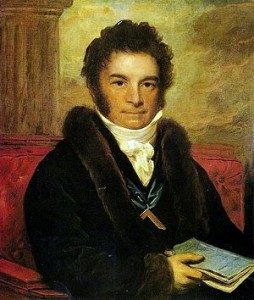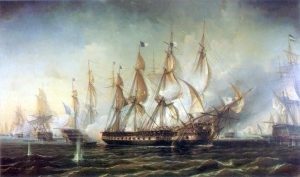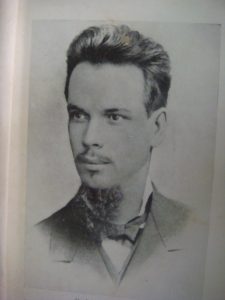Targini na mídia – notícias
8 Min. de Leitura
NOTÍCIAS SOBRE FRANCISCO BENTO MARIA TARGINI, EM PERIÓDICOS DA ÉPOCA
LISTE GENERALE DE PARIS – 1827
BIOGRAPHIE UNIVERSELE ANCIENE ET MODERNE, MICHAUD
TARGINI V -4
Pagina 566
TARGINI, FRANCISCO BENTO MARIA, Visconde de São-Lourenço, né à Lisbonne, en 1756, descendait par son père d’une famille italienne. Il cultiva de bonne heure la poésie, et se familiarisa avec les langues étrangères.
Cependant le manque de fortune le força à chercher une place, et il eut le bonheur d’en obtenir une au Tresor public, où ses connaissances en matière de comptabilité et son activité ne tardèrent pas à le faire remarquer par ses supérieurs.
Bientôt il obtint un emploi administratif important au Brésil, qu’il exerçait lorsque Jean VI, à la fin de 1807, transféra sa cour à Rio Janeiro.
Fallut alors donner une nouvelle organisation à toute l’administration, et Targini fut plaré à la tête de la trésorerie, où il fit preuve d’intelligence, el rendit des services à l’étal, quoi qu’en aient dit ses ennemis, jaloux de la faveur que lui accordait le roi. Ce prince le nomma commandeur de L’Ordre du Christ , el le créa vicomte de San Lourenço.
Lors des commotions qui eurent lieu à Rio de Janeiro par suite de la révolution de Portugal en 1821, il fut brusquement appelé à rendre sés comptes, ce qu’il fit sur-le-champ et avec une telle exactitude, que ses ennemis ne purent lui faire le moindre reproche; toutefois il fut destitué, et meme arrêté dans un moment d’effervescence, mais sou innocence ayant été reconnue, il fut remis en liberté.
Il prit alors le parti de quitter le Brésil, obtint à cet effet un congé illimité de Jean VI, et s’embarqua avec sa famille pour le Havre, où il débarqua et séjour a quelque temps; il se rendit ensuite à Paris, où il resida jusqu’à sa mort. Après une courte maladie, il fut saisi d’une attaque d’apoplexie, et expira le 18 mai 1827.
Ceux qui avaient, sur les bruits publics, cru qu’il avait amassé d’immenses richesses fureut fort étonnés à sa mort de la médiocrité comparative de sa fortune.
Il avait épousé à Lisbone mademoiselle Deville, fille d’un négociant français, dont il n’a point eu d’enfants.
(Nota: Francisco Bento Maria Targini, aos 35 anos, casou-se em Lisboa, na Igreja de Nossa Senhora da Vitória, pertencente à Paroquia de São Nicolau, em 03/11/1791, com Maria Leonor de Santana Freire, nascida em Anjos, Lisboa, em 1757. Viúvo, casou-se na França com Marianne Deville, filha de um negociante . Não teve filhos. Seu herdeiro, o sobrinho José Maria Targini, nasceu no Brasil e aqui faleceu, deixando vasta descendência
Targini a publié :
1 – Une traduction de ESSAY SUR L’HOMME, de Pope , en vers portugais, Londres – 1818 , 3 vol. Èdition magnifique, ornée de belles gravures. Cette traduction est assez fidèle, mais elle ne rend qu’ imparfaitement l’esprit de l’auteur; M. Targini l’a tellement surchargée de notes, que l’Enssay de Pope n’est qu’un très petit accessoire de l’ouvrage, dans lequel on trouve presque en entier version de la philosophie de Kant, par Villers, en forme de notes, et d’autres morceaux d’une étendue démesurée.
2 – Le Paradit Perdu, de Milton , traduit en vers portugais, Paris, 1824. 2vol. C’est une copie bien pâle du plus grand poête épique moderne.
Targini a laissé fort avancée une traduction de La Jérusalem délivré* du Tasse, dont la langue, plus rapprochée de celle du traducteur, et le genre plus analogue à celui des épopées portugaises, offraient de grandes facilités.
Il faut espérer que la partie de sou travail qui est terminée sera publiée par sa veuve. Ce littérateur possédait une instruction êtendue. Il est avait dans sa jeunesse acquis beaucoup de célébrité par plusieurs satires pleines de sel qui n`ont jamais été publiées.
THE MORNING CHRONICLE.
L O N D O N :
W E D N E S D AY, A P R IL 16, 1828.
King John VI. was rather of a savage character, particularly after he gave up the amusements of hunting and riding, of which he was, in his younger days, extremely fond. He was then considered as one of the most graceful and bold riders in Portugal. At the period of his departure for Brazil, in November, 1807, it was estimated that be had with him about one million sterling in gold, which sum, it was supposed, was doubled at tbe time of his return to Europe. The fifth of the gold dust and diamonds obtained in his Brazilian dominions belonged to himself. At the time of his death he is- estimated to have left about two million? and a half sterling, exclusive of diamonds, and he was one of the oldest shareholders in the Oporto Wine Company. He held shares which belonged to his father. The portion of his property, which bas already been distributed among his heirs, is his diamonds, and about 250,060/ sterling, the amount stipulated in a secret article of the treaty between Portugal and Brazil, for the acknowledgment of the independence of the latter, to be allowed him as an indemnity for his fixed property left behind in Brazil, viz. the estate of San Cristoval, the present Imperial residence, and that of Santa Cruz, formerly belonging to the Jesuits, and considered as one of the most beautiful situations in Brazil. The above sum, we have reason to believe, was paid by the agents of the Brazilian Government in London & divided in the proportion cf about 50,000/. to each surviving child. The property left by the King in foreign stocks has not, we believe, been yet touched. It was always supposed that the late King had a considerable sum in the French Funds, under the charge of Targini, long the Treasurer-General of Portugal, and afterwards raised to the rank of Viscount San Lourenzo. He was the translator of Pope’s Essay on Man into Portuguese, and published a beautiful edition of this piece. The Viscount was a private agent of the King in his money concerns.
Courier July 27, 1821
Courier July 27, 1821 We have received O Porto Papers this morning to the 10th inst. They concern some additional, and not unimportant particulars, respecting the reception of the King of PoRTUGAL. on his arrival in the bay of Lisbon. The Cortes seem disposed to abate no jot of the authority which they have in their bands. Among the decrees which they passed, before they would signify their permission for the King to land, was one, forbidding all exclamations of joy on the part of the people, unless expressed in a set form of words; and another, prescribing, by clams, certain of his Majesty’s Ministers and attendants, as unworthy to revisit their native country. In short, from the apparent temper of this revolutionary body, and the timid acquiescence of the King, we may expect to witness encroachments upon the commonest courtesies due to his station, which will doubtless be eminently gratifying to the admirers of republican ferocity. ” OPORTO, J U L T 9. ” The Cortes of the Kingdom, in their Session of the 3d of this month, thought it necessary to pass several resolutions previous that he landing of his MAJESTY. The following is the substance of them : ” 1 . An order respecting the reception of his MAJBSTY, and leaving it to his Royal pleasure to choose the hour o f his landing, provided it were not later than midday. ” 2 . A decree, ordering, that to prevent any disturbance of the public peace, on the KING’S landing, or on any other occasion which may occult. if some persons should utter inconsiderate acclamations, or vivas, contrary to the general will of the nation, to which his MAJESTY has solemnly adhered, any person shall be looked upon and punished as a disturber of the public peace, who on such occasions shall utter any viva, (long live) except to Religion’ the Cortes, the Constitution, the Constitutional King and his Royal Family. ” 3. No public office shall be given to a foreigner, without the consent of the Cortes. “4 . Till the Constitution is sanctioned, the KINO cannot remote, without the consent of the Cortes, the Commanders of the troops in the Cities of Lisbon arid Oporto, and their neighborhoods, nor the Intendant-General of the Police. 5. All notice to the Conde dc Samparo, as follows: “Most Iiustrious and iaost excellent Sir, it being notorious to the Courts, that his MAJESTY, on his return to this kingdom, is accompanied by several persons who have incurred the public indignation, as being generally known to be the authors of the misfortunes of the country viz.: –The Conde de Palmella, the Conde de Paraty, the Lobatos, the Ex-Minister Villa Nova Portugal, Rodrigo Pinto Guedes, Targini, the Viscondc do Rio Secco, Messrs. Miranda and Almeida, and Joao Savinano Maciel; and considering that the landing of these persons may be attended with imminent risk of their personal safety, the Cortes order, that the Regency of the Kingdom, by the medium of the Deputation which it sends on board to compliment the KIKG, shall represent the necessity of not suffering such persons to land, and trouble the public joy with which his MAJESTY is expected by the heroic Portuguese people, ” We have received numerous letters respecting the KING’S landing from which we select some particulars. ” On the 11 of July about ten in the morning, his MAJ E S T Y shelved himself on the deck of the ship to the crowds’ of peoples who were impatiently watching for his Temperance, and hailed him with enthusiastic acclamations. Soon after, the Princess Dowager, and her august daughter, also appeared. After a short interval the Deputation of the Cortes arrived and was received with a salute from the guns of the whole squadron. On its entering the ship the music played the Constitutional hymn. ” His MAJESTY received the Deputation standing; the latter saluted him within inclination of the head, which he returned’. • The Archbishop of Bahia made a speech, to which his MAJESTY listened attentively, interrupting him once, by speaking to him. The Deputation after was returned, and the KING held a Council of State, consisting of Senhores Pinheiro, Monteiro, Torres, and Quintella, his Secretaries, that they might examine the bases of the Constitution which the Deputation had presented to him. The Secretary Pinheiro, read the articles, which were analyzed he proceeded. In the end, of the discussion, which lasted two hours and a half, M. Quintella seemed the most agitated (or angry, altered.). His MAJESTY resolved to land, but meantime there was another brief Council of State.”








Sylvia! Achei muito interessante a publicação francesa. Lendo algumas fontes francesas há poucos anos lembro de ler que ele havia se casado com Mme Deville, porém não tinha achado este relato sobre suas contas. Considerei uma ótima evidência de sua inocência, tendo em vista a visão menos pessoal da imprensa francesa com relação ao caso, tanto quanto pela sua maior credibilidade naquela época.
A veracidade do documento também é inegável, comprovada por expressões do francês antigo presentes na notícia.
Excelente!